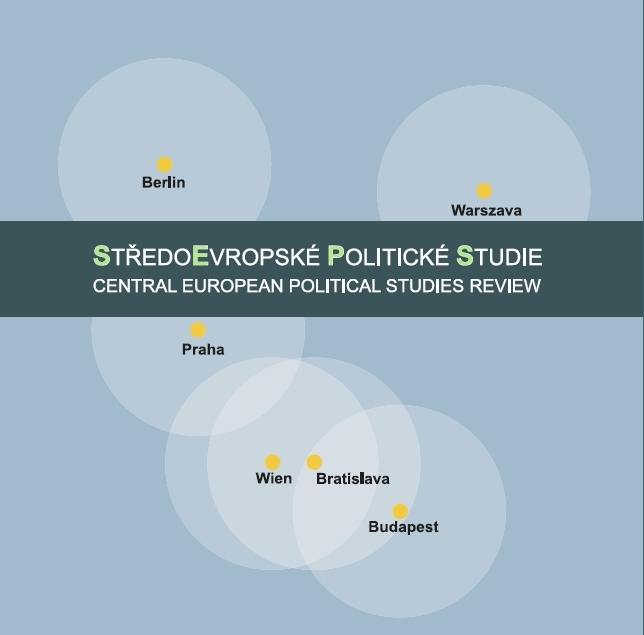
We kindly inform you that, as long as the subject affiliation of our 300.000+ articles is in progress, you might get unsufficient or no results on your third level or second level search. In this case, please broaden your search criteria.


This article is concerning the topic of authoritarian repressive strategies in hybrid regimes in Latin America. Despite the current academic literature being interwoven with references to the presence of authoritarian repressive strategies in competitive regimes, there is only a little attention being paid to the analysis of their causes in hybrid regimes by the researchers. The goal of this article is to fill the gap, at least partly, and to contribute to resolving this issue by confronting the existing theoretical knowledge with the empirical reality of Latin America. The conclusions show that a big part of the theoretical knowledge that was gathered in recent years will need to be at least revised. First, I find that extensive international relations to the USA reduces the level of intimidation against oppositions, but not affect the other authoritarian repressive strategies. Second, the results show that rulers do not choose the form of repression based on whether they have or not they have a legislative majority. And finally, these results show that our ability to explain the causes of long-term repression is fairly limited.
More...
In August 2021, the US military engagement in Afghanistan ended, after almost 20 years of conflict with the Taliban and terrorist organizations, with the engagement of allies, primarily NATO member countries. Given the participants in the war, the consequences of the war, as well as the inability to predict further events, the world is flooded with a multitude of analyzes, reactions, predictions and other observations of that war. These reviews come from officials of many countries and international organizations, as well as from scientific institutions and analysts to social networks and other media spaces. This article is a view of American participation in the war in Afghanistan through a key document – the national security strategy, ie the national interests established in it. In that sense, 17 strategies of the USA, adopted in the period 1987-2021, were subjected to research. year, certainly heavier documents from 2001, when the direct US military engagement in Afghanistan began. The basic hypothesis of the research is: “US engagement in Afghanistan was supposed to confirm American dominance in the world after the Cold War, as one of the vital national interests established in all national security strategies, but it did not have clear goals.”
More...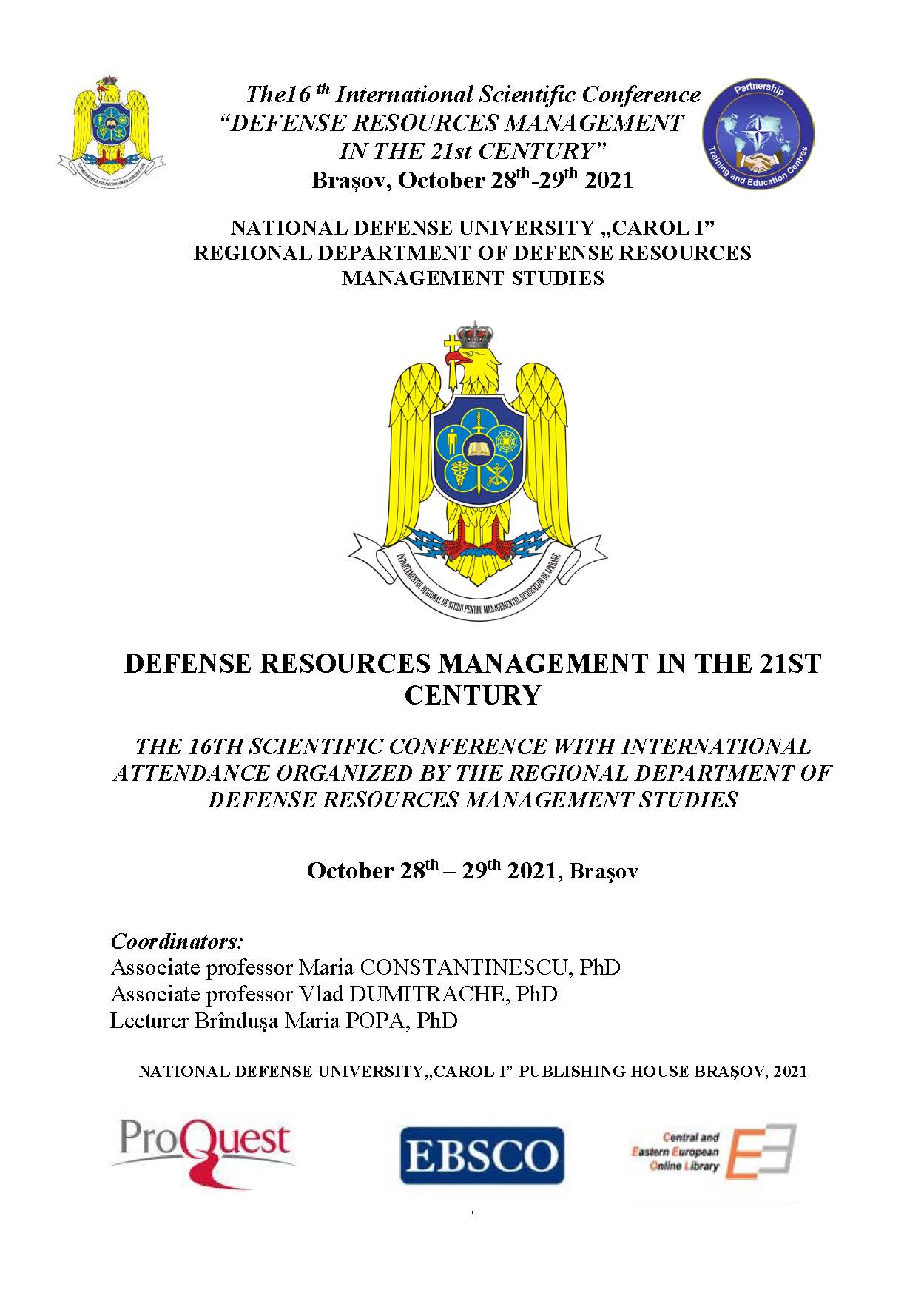
Understanding human behavior is imperative for the success of HUMINT in military deployments, no matter if this refers to the enemy, friendly or own troops behavior. Whoever has the power to influence human behavior – besides the ethic responsibility for such actions that is not the subject of this article – is able to efficaciously achieve the desired objectives. Nowadays, the human behavior in general, is part of an extended human network enabled by social media, households, Internet of Things and Internet of Everything, all together forming the “actors” within the cognitive environment. Like many other “military tools”, HUMINT needs to be able – to a certain extent – to shape the hearts and minds, particularly the human source ones. The old model of winning the hearts and minds, generally applied in counter insurgency operations and not only, was instinctively applied in HUMINT domain with positive results. Nevertheless, the complexity of the cognitive environment, where the dexterous influencers are playing the “molding games”, necessitates a methodological and scientific approach that requires to firstly analyze our own behavior and then to influence others. A Cognitive HUMINT Tool enables the understanding of how the heart and mind can determine the actions, or vice-versa, and would create the premises for shaping the human sources.
More...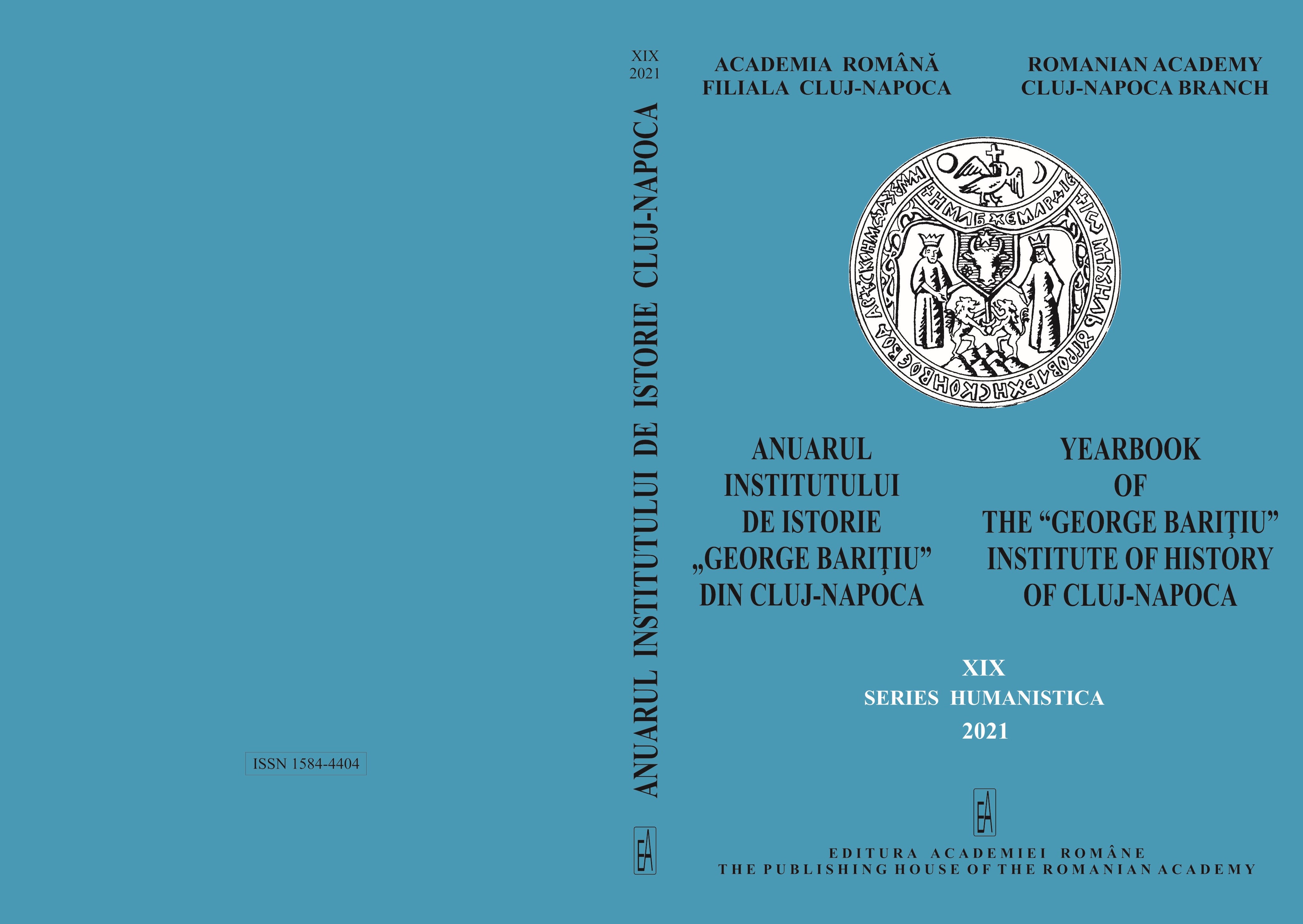
The effervescence of the interwar period also contains the sad story of a brilliant young generation, but lost – intellectually – in the destructive passion of politics. Their search for philosophical, spiritual and political renewal inclined them to fascist doctrines, while their concentration on ethnic, nationalist, Romanian Orthodoxy led them to the legionary movement and anti-Semitism. The present paper offers an overview on the delicate issue of anti-Semitism in interwar Romania and exemplifies it with several successful stories of individuals who managed to escape, just in time, the terror of history.
More...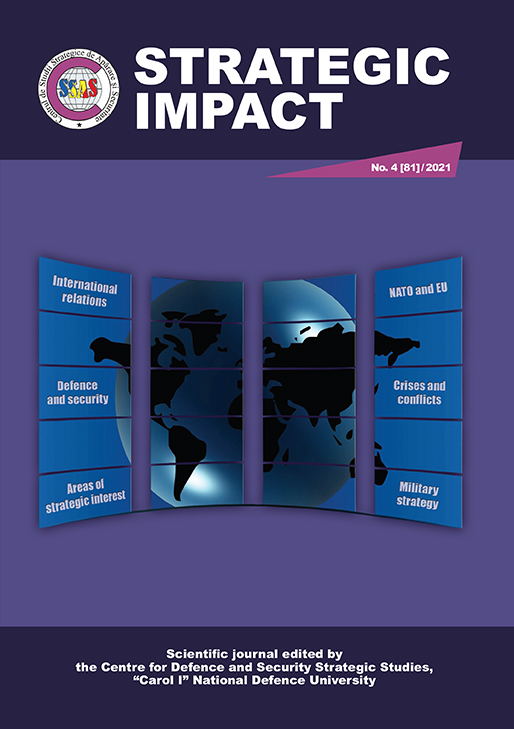
To combat extremist ideologies and the threat of mass radicalisation, experts have developed a series of research in order to identify and understand the factors that lead to the radicalisation of an individual, but also the factors that, having an opposite effect, can lead to its deradicalisation. Therefore, more and more authors recognize the importance of studying the process of deradicalisation and its potential for today’s society. Hence, the paper aims to further address this process by presenting specific terminology, theoretical and practical models of deradicalisation, and signalling difficulties and limitations during the development of national disengagement and deradicalisation programs caused by the lack of practical information on the results of these initiatives.
More...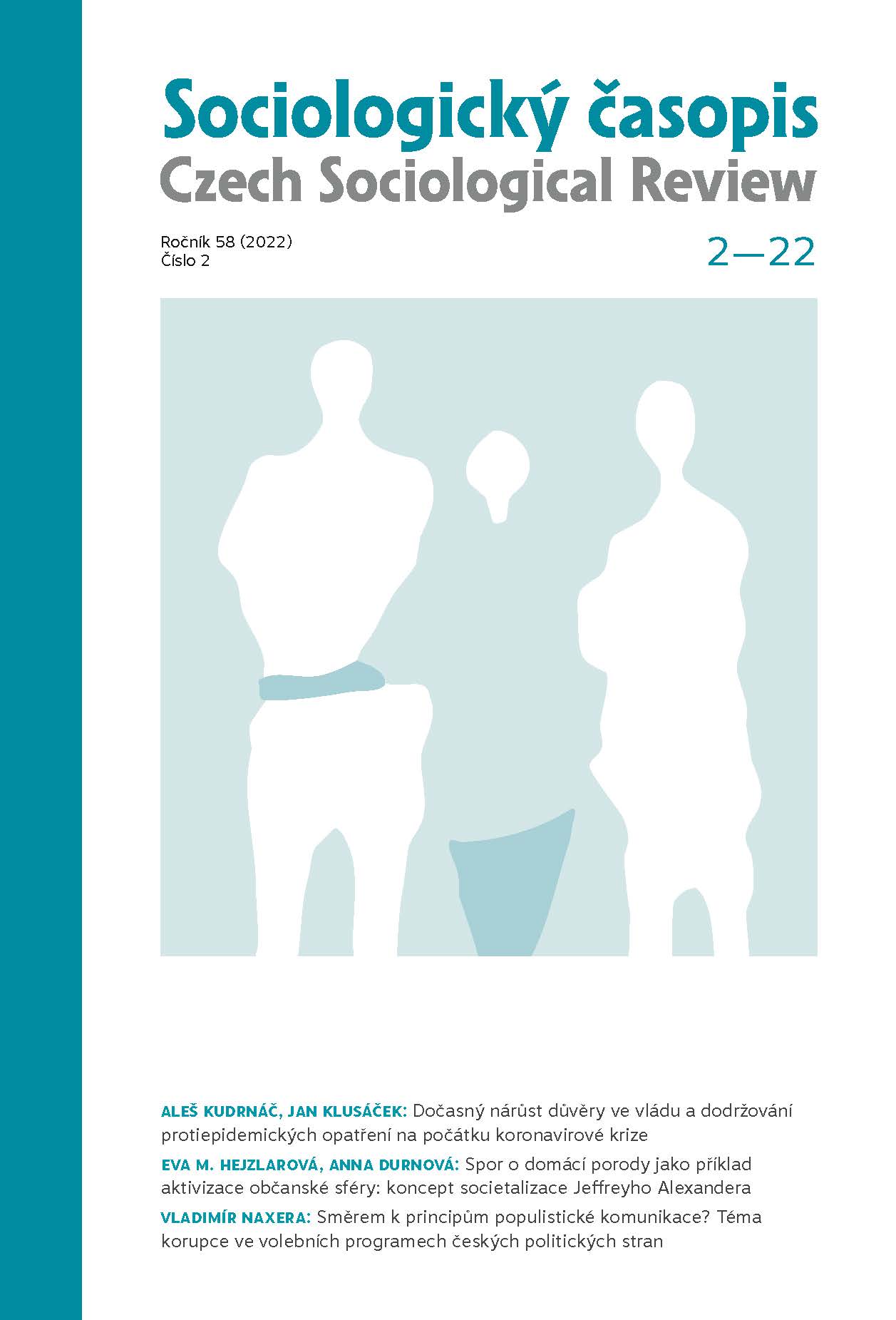
Public support for government institutions tends to increase in the face of threats such as armed conflict, terrorism, or natural disasters. This phenomenon, known as the 'rally-'round-the-flag' effect, has also been observed as a response to the Covid-19 pandemic in many countries. Citizens' trust in the government's good intentions and ability to handle a crisis is very important, as it gives government the legitimacy to take strong measures. High trust in government also increases citizens' willingness to comply with these measures. The aim of this study is to examine the 'rally-'round-the-flag' effect in the Czech Republic, analyse the characteristics related to the increase in trust in government, and test the relationship between trust in government and compliance with anti-pandemic measures. The analysis uses data from five waves of the Czech Household Panel Study (2016–2020) and finds a dramatic increase in trust in government in response to the Covid-19 pandemic. A relatively higher increase in trust in government was observed among people with a low level of education and low social trust. Overall, however, the rise in trust in government is more of a general tendency across society than it is an increase in one specific group of the population. Trust in government is also linked to compliance with anti-pandemic measures.
More...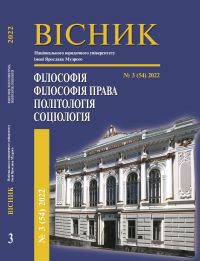
Discourse analysis allows us to identify markers of change in values, which is a sign of democratic development. However, this does not mean a radical change in values, but rather their correlation with the economic, social, cultural dimensions of society. When it comes to national security as the value of the country, then here we can see the dichotomy of the collective “we” with the individualistic “I”. In democratic societies, the priority of national security is higher than the values of self-expression, while the authorities guarantee human rights and freedoms. The study provides a theoretical analysis of the nature of official political discourse. The influence of discourse on the political system through the category of «security» is considered. At the first stage, the theoretical and methodological analysis is conducted in terms of social practice of G. Deleuze and M. Foucault. At the second stage, a comparative analysis of the concept of national security of Ukraine was conducted. At the third stage, markers of the value components of Ukraine’s national security were identified, which both presidents have used. This allowed us to understand the discourse practice of official political discourse as a strategy to influence the political system.
More...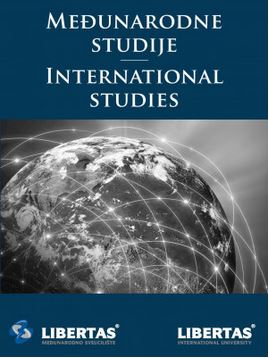
An increase in the number of populist parties was recorded in the eighties of the 20th century, and several types of populism appeared in theory. On the one hand, some view populism as an ideology based on a positive assessment of people and a negative assessment of political elites, while on the other hand, some recognize populism as a style of political communication, that is, frequent positive references to people or the use of certain linguistic figures aimed at getting to know voters. The latter interpretation of populism was the theoretical basis for this research, in which the authors, analyzing the degree of populism in the Croatian Parliament, answer the question of whether there is populist communication in the Croatian Parliament using the method of qualitative analysis of the phonograms of parliamentary questions and replies to the government’s answers at the current morning meetings of the representatives of the 10th convocation of the Croatian Parliament. from September 16, 2020 to April 20, 2022. The aim of this paper, based on the theoretical background of Jagers and Walgrave, is to comprehensively investigate the elements of populist discourse among representatives of all political parliamentary parties, from the left to the extreme right of the political spectrum.
More...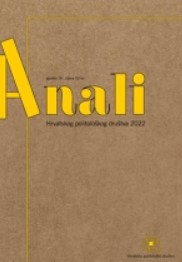
The concept of correct voting, which refers to a vote that is the same one that would have been made under conditions of full information, has been used to evaluate citizens' voting decisions in various settings. Most studies either focus on determining individual and situational predictors of correct voting or determining the correctness of voting via heuristics. Since heuristics can lead to better decision outcomes than systematic processes, the goal of this study was to analyze how different modes of decision-making strategies, as well as individual and situational characteristics, contribute to correct voting. To answer this question, an experiment was conducted in Croatia, a previously unstudied context for correct voting, in which participants gathered information on four parties in a mock election campaign. Results showed that higher political motivation and usage of compensatory decision-making strategies had a positive impact on the probability of casting a correct vote. However, direct effect of cognitive load was found for participants with low levels of political motivation, for which an increase in cognitive load resulted in 25% less probability of voting correctly.
More...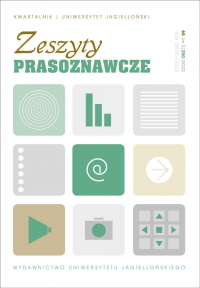
The purpose of this paper is to draw attention to the important issue of the use of immersive media in political communication. This article serves as an adumbration of this vast subject. On one hand the author presents the issues connected with the use of holograms in the electoral campaigns – promoting the image of specific politicians. On the other hand, 3D holographic images are used in political protests of citizens. In addition to these considerations, the author points out the use of holograms in commercial activities and entertainment business. The author points out that the development of immersive media: vision and location-based media, is a natural path of development of interactive communication channels in the public sphere immersed by media – MediaPolis. Additionally, it raises questions about the ethical dimension of using this technique in political communication.
More...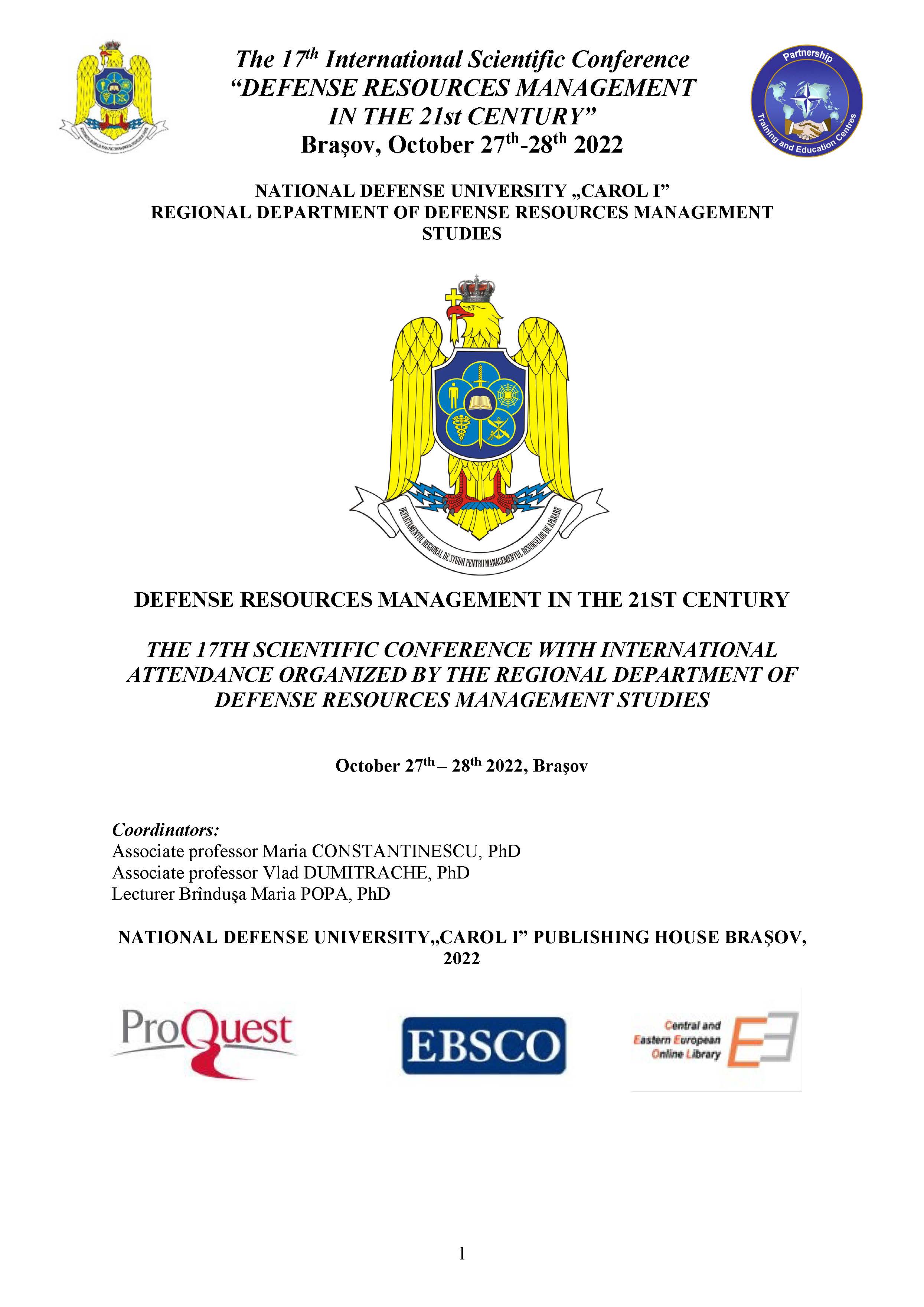
Being ethical leader is not as easy as other job. There are a lot of challenges but I always believe that if there are a lot of challenges there are a lot of solutions too. If we understand that how to properly and ethically communicate with our subordinates we can understand their problems easily. Communication starts with listening. Ethical leader has to be good listener. If we know how to use our team member,s capabilities properly we can find way to success easily.
More...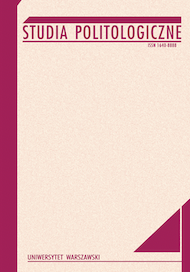
Political leadership is among the fundamental political-science categories, it remains to be defined clearly as a phenomenon. Nevertheless, as the years have passed, conditions in and around political systems have given rise to leadership models models describable in line with a triad of change from traditional leadership to marketing-oriented leadership and then to neo-leadership. The innovative definition of the latter has then been brought together with considerations of political image, with the resultant category then proving of interest to those researching either the political, or the sociological, or the communicological perspectives. The images of all key players in politics are both created and managed, while leadership that is actually effective or perceived to be so is essential if political power and support are to be built and maintained. The example of Polish President Andrzej Duda is here used in an analysis of the image of Head of State, in the circumstances of the 2015–2020 period overall, as well as the 2020 (re-) election campaign. This is done with a view to answering a general question regarding the extent to which a given politician (and here A. Duda specifically) is the creator or the prisoner of his/her own image. Account is thus taken of the factors shaping the image of this particular President (i.e. advisors and family, the media and the electorate). While the conclusions obtained here are not unequivocal, they do open up new questions relating to the future of leadership in times of crises and the existence of major populist movements. Consideration of these issues is here based mainly on the comparative and historical methods.
More...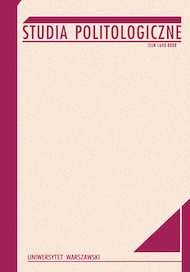
Transformations of ideological systems, institutional structures, models of political order and socio-political movements are cyclical processes of integration, disintegration, reintegration of large social groups and communities occurring due to changes in the circumstances of their functioning, reevaluation of the criteria for the validity of social demand, revision of the designators of collective identity. The recurrence of such paradoxical recurrences (although in altered conditions and forms) of what seemed to have been overcome is ruled by dialectical laws: the contradictory nature of any phenomena, self-denial or negation via alternative factors, and then negation of negation. This explains the paradoxical continuity in the variability of ideas, structures, patterns of action, symbols, political rituals.
More...
Nowadays, much attention is paid to the leaders of political groups because they determine the direction of a political group and create government policy. The media also play an important role in the portrayal of leading politicians and their activities. The responsibility that political leaders bear is multidimensional, including issues related to their mandate as MPs. This article analyses the work of MPs who simultaneously headed political groups represented in the Sejm of the 8th term. The research may serve as a basis for a broader discussion on the role of group leaders in parliament.
More...
The article discusses the philosophical foundations of ethical responsibility. It ponders the question whether scientific progress should be associated with an unlimited degree of freedom to conduct research. It discusses in detail the distinction between responsibility in the formal sense and material sense introduced by Hans Jonas. It considers several examples of the similarities between politics and science as disciplines and elaborates on aspects which connect them. It treats Kant’s notion of the categorical imperative as a point of departure towards exploring the boundaries of political responsibility verses individual responsibility. It subsequently goes on to ask the question whether scientists and politicians are faced with a greater sense of responsibility towards the wellbeing of future generations. Finally, it analyses the example of the Environment Minister and later Secretary of State Jan Szyszko, who is also an entomologist and a researcher of animal population. It aims to establish whether his conduct as a minister was influenced by the and values he attained as a member of the scientific community.
More...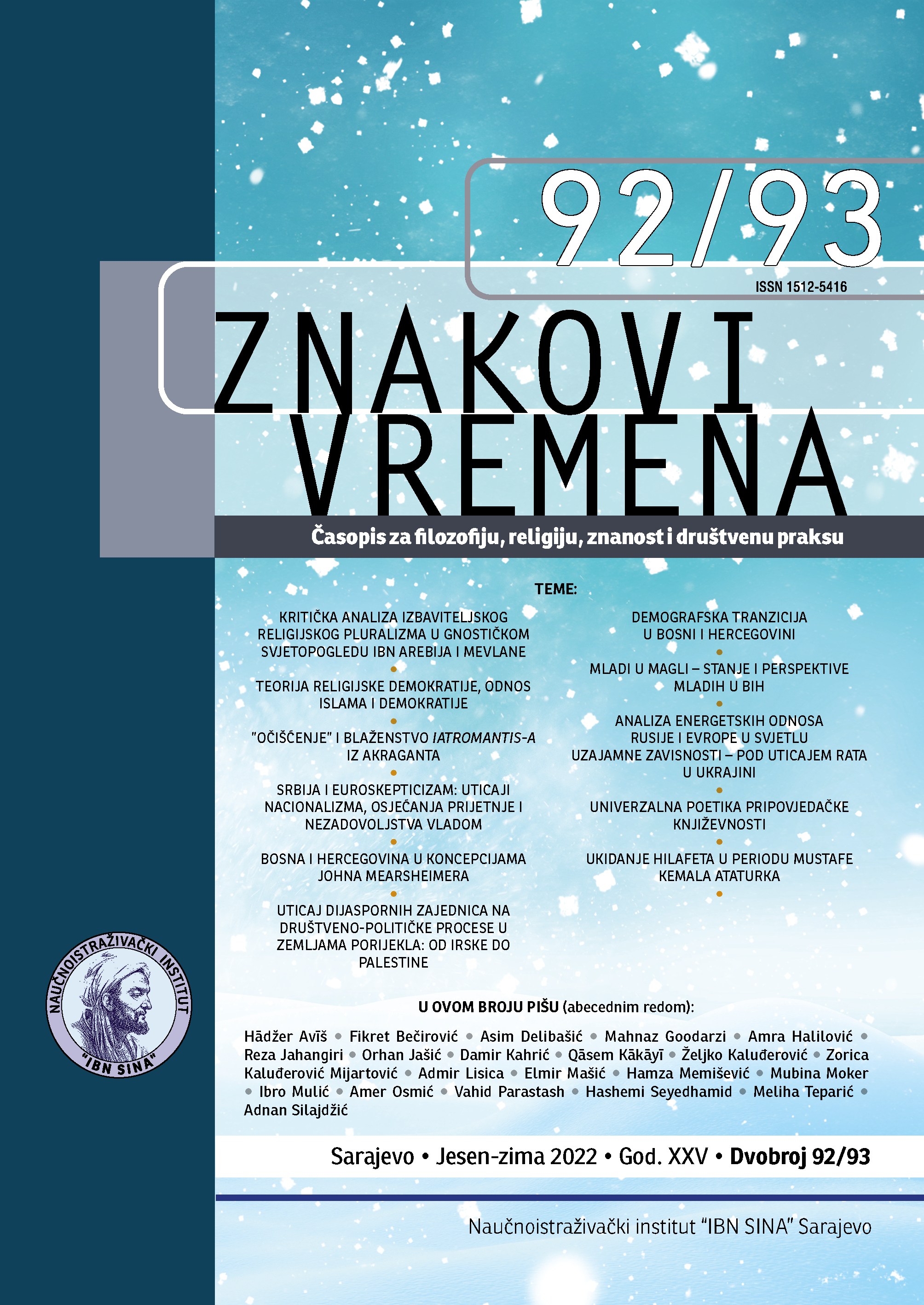
The term Euroscepticism denotes a negative attitude towards European integration, and more precisely towards the European Union itself, which is usually expressed as distrust towards the goals, policies, institutions, and expansion of the European Union. In many European countries, Euroscepticismis linked to the desire to retain national sovereignty, which is a feeling usually associated with certain national fears and opposition to certain conditions of European integration. The history of Serbian relations with the European Union is burdened by the Balkan wars in the last century and with the built-up feeling that Europe represents a kind of arch-enemy to the Orthodox culture of Serbian nation. Fierce national resentments over disputed territorial issues, which refers primarily to the Kosovo and NATO’s war against Serbia, along with the deep-rooted anti-Western stance of the Serbian Orthodox Church, constitute the very essence of the Serbian Euroscepticism. The purpose of this research was an analysis of the variables that influence Euroscepticism in Serbia, especially attitudes and feelings, such as those of national pride, trust in the church, feelings of the nation being threatened by the European Union, and feelings of dissatisfaction with the government and state institutions. Statistical analysis showed a weak, although significant, effect of nationalism, trust in the church, and the feeling of national threat from the European Union, but also an extremely strong effect of dissatisfaction with the functioning of the government and state institutions.
More...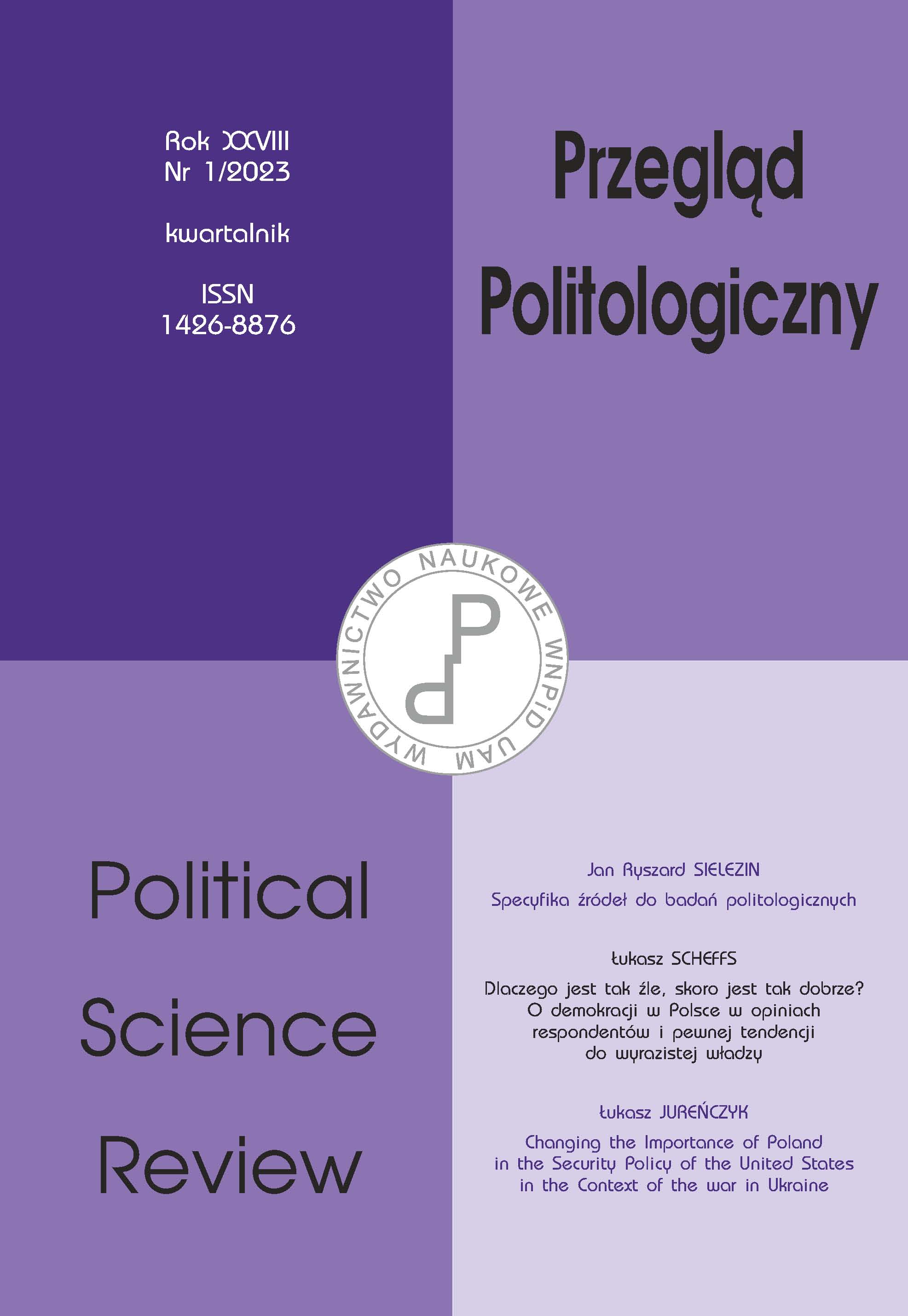
Reflection on democracy in general, as well as its specific case, always poses many problems. They begin at the stage of trying to answer the question: what kind of democracy are we thinking about? What axio-normative foundation is at the base of the system which, in our (probably subjective) assessment, meets the criteria of sui generis democracy?Each of the intellectual attempts to capture the democratic phenomenon only to some extent answers the questions that bother us: sense, meaning, future and potential collapse of the system. The sketch presented here is only an attempt to present the opinions of the surveyed groups of respondents on the system and determinants of the democratic system in Poland and the confrontation of the opinions presented in the analyzes cited here with the general concept of decapillarization of power.The observations contained in this study are the result of a reconstruction made on the basis of the available literature on the subject and secondary data from research conducted by other authors, most often as part of broader research programs (projects). In this sense, the work is of a contributory, descriptive nature, and its considerations fall within the constructivist trend of contemporary social sciences, with particular emphasis on the sciences of politics and administration.
More...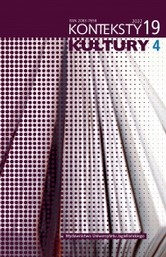
The obscene aspects of power are the guilty pleasures of the insecure “Schongeister.” They are the reason for artists and intellectuals to join the ruling camp – a reason perhaps more frequent and an incentive stronger than fear and opportunism. This underestimated background of the motivations in the spectacle of power – both under communism and today, when power comes from a democratic mandate – is analyzed here using the observations offered by contemporary psychoanalytic thought.
More...